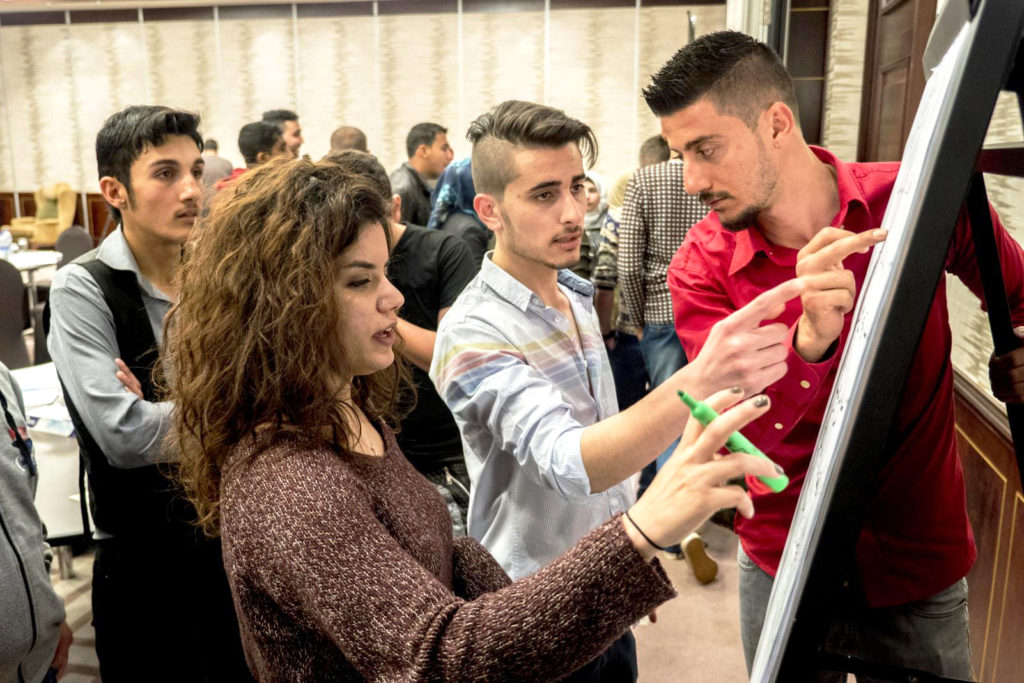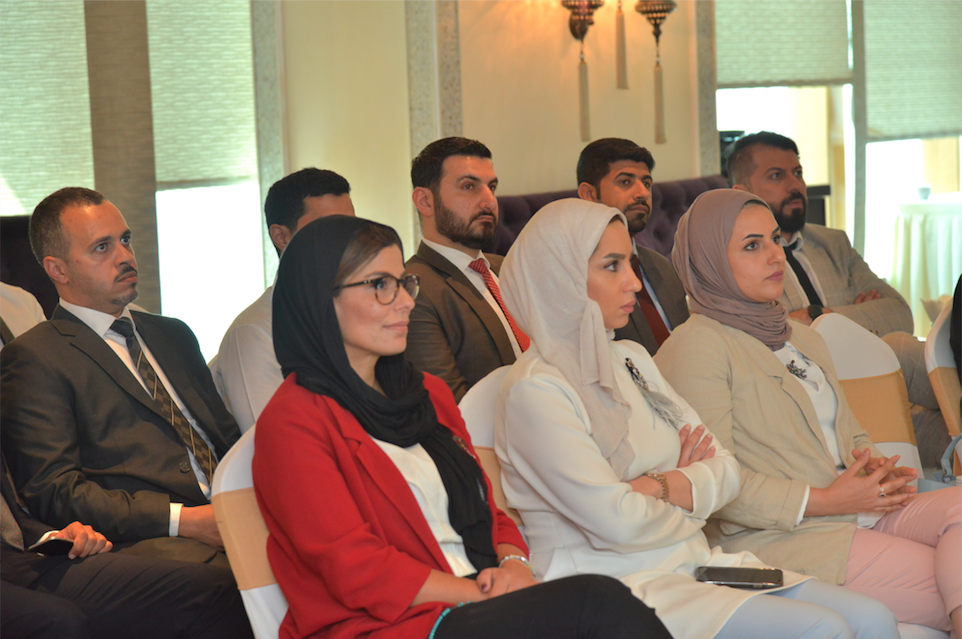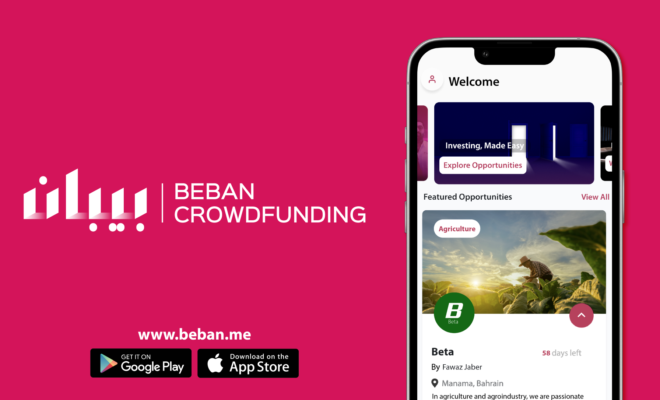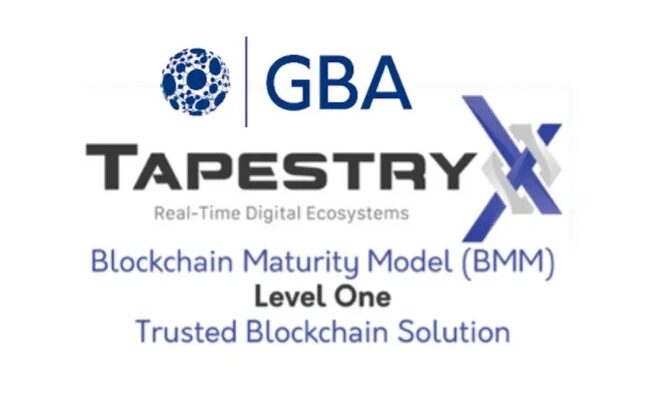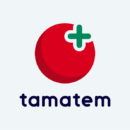Financial Inclusion For Women And Youth In The Arab Region
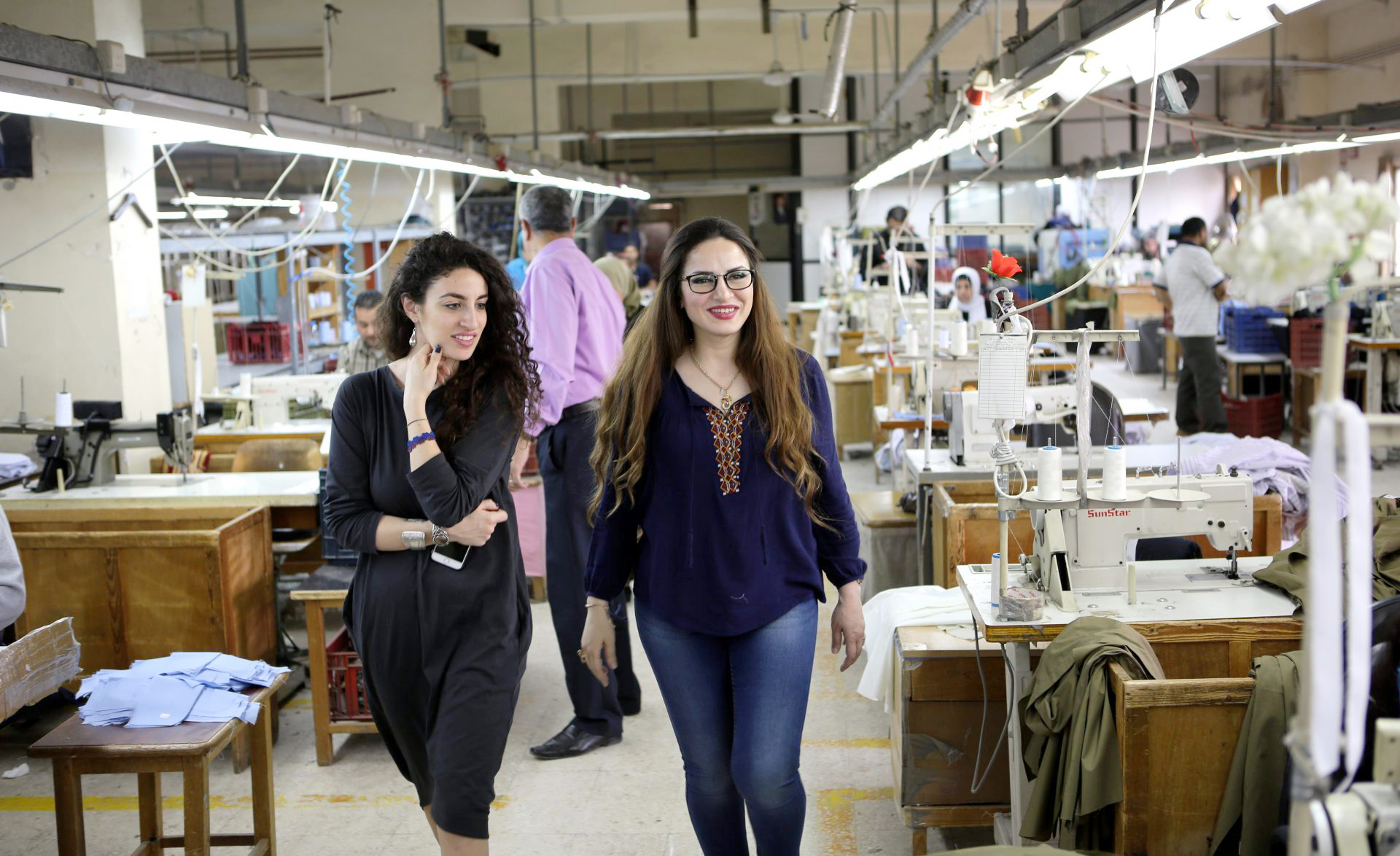
As an integral part of the week-long celebration and in conjunction with the Global Entrepreneurship Week (GEW), a panel discussion co-organized by UNIDO-ITPO was held during the event. Entitled Financial Inclusion for Women & Youth in the MENA Region; the discussion talked about economic empowerment outlining six recommendations to achieve the SDGs.
In an effort to meet the Sustainable Development Goals 2030, economic empowerment is a cross-cutting issue of importance for achieving all the SDG’s; thus taking a leading significant positive impact on sustained economic growth and sustainable industrial development, which in turn are drivers of poverty reduction and social integration. The United Nations Conference on Trade and Development (UNCTAD) says achieving the Sustainable Development Goals (SDGs) will take between US$5 to $7 trillion, with an investment gap in developing countries of about $2.5 trillion.
Thus, economic growth required for the eradication of poverty and the achievement of the other associated SDGs depends on technical change and capital accumulation (investment). Therefore, in order to attain growth, developing countries and those with economies-in-transition need to mobilize investment– both domestic and foreign – as well as modern technologies in order to expand their productive assets and meet the Sustainable Development Investment Gap. While financing is the driver behind investment and entrepreneurs; access to finance and developing the right effective financial tools to service entrepreneurs becomes a crucial component as traditional banking practices are not fully geared towards achieving financial inclusion. Keeping into consideration that financial inclusion, as per the World Bank, means that individuals and businesses have access to useful and affordable financial products and services that meet their needs – transactions, payments, savings, credit and insurance – delivered in a responsible and sustainable way.
Accordingly, financial inclusion intends to increase awareness about the benefits of financial services among the economically underprivileged sections of the society and in the case of the MENA Region these represent women and youth. Hence, the process of financial inclusion works towards creating financial products that are suitable for the less fortunate people of the society. In line with the above; the MENA Region is mainly characterized by predominantly being a young population with an average of 60% below the age of 29 years. Power struggles, tensions, and conflicts lead to poverty, instability, migration and conflict. Coupled with this and based on the financial inclusion index published by the World Bank the MENA Region scores very low.
With this, the way forward to resolve this vicious circle is in economic development leading to prosperity for all. This can only be achieved through developing public – private partnerships that are governed by the rule of law and good governance with an emphasis on impact investing which will create a trickle-down effect; thus, economically empowering women and youth will have its positive effect on the individual, the family, society, community and eventually the economy.
For this we strongly believe that the private sector and banks, specifically, can and should play a vital role in supporting the governments in facilitating financial inclusion thus leading to achieving the SDGs through:
1.supporting financial institutions in adopting and institutionalizing best practices that have proven successful in achieving the economic empowerment of youth and women and which entail linking financial and non-financial services for both start-ups and growth;
2.supporting the growth of micro, small and medium enterprises (MSMEs) and entrepreneurs through mentoring and counseling;
3.financing and developing economic infrastructure facilities like agro poles; incubation management systems, free zones, etc. and linking those with full-fledged entrepreneurship programs;
4.expanding and enhancing existing financial tools such as Venture Capital Funds, angel funds and crowd funding platforms in addition to Islamic Sharia Compliant tools;
5.unleashing innovation and modernizing the transformation of educational systems which adopt procedures that take into account “Education, Innovation, Incubation leading to Entrepreneurship”;
6.facilitating investments, synergies, partnerships, collaboration and prosperity between entrepreneurs.
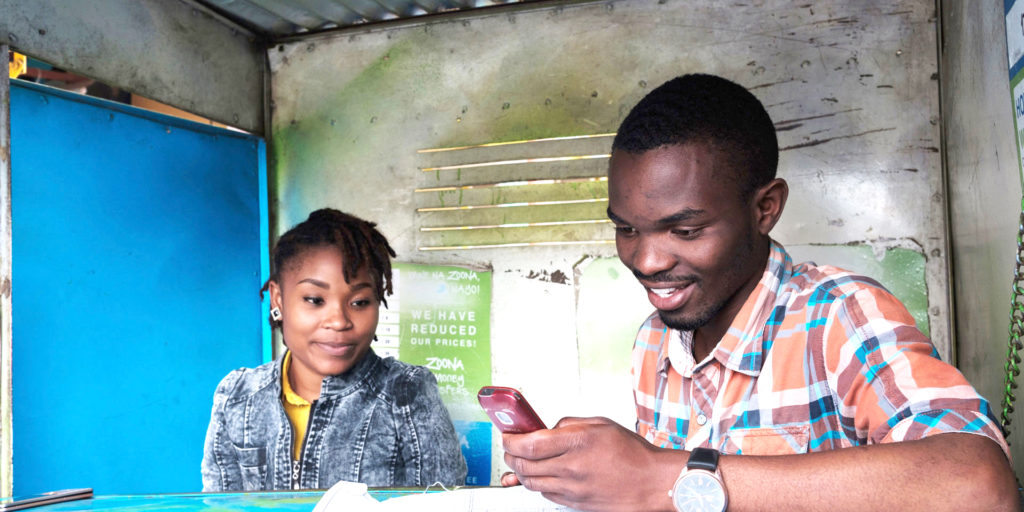 Further to the above, in line with UNIDO ITPO Bahrain’s long experience in over 52 countries around the Globe, I would like to highlight one case study developed in Sudan in cooperation with the Family Bank in Sudan (Al Osra Bank); which was based on strengthening the capacities of the bank in the area of the provision of non-financial services and the importance of linking it with financial services. The support extended to Al Osra Bank which for the past four years has led to the establishment of the “National Center for non-financial services”; which provides non-financial services to the bank beneficiaries which include women and youth entrepreneurs. Through the provision and link between financial and non-financial services we have been successful and effective in migrating women entrepreneurs from the informal to the formal sector in addition to scaling their enterprises from micro to small and eventually to medium.
Further to the above, in line with UNIDO ITPO Bahrain’s long experience in over 52 countries around the Globe, I would like to highlight one case study developed in Sudan in cooperation with the Family Bank in Sudan (Al Osra Bank); which was based on strengthening the capacities of the bank in the area of the provision of non-financial services and the importance of linking it with financial services. The support extended to Al Osra Bank which for the past four years has led to the establishment of the “National Center for non-financial services”; which provides non-financial services to the bank beneficiaries which include women and youth entrepreneurs. Through the provision and link between financial and non-financial services we have been successful and effective in migrating women entrepreneurs from the informal to the formal sector in addition to scaling their enterprises from micro to small and eventually to medium.
Another mandate of the National Center is that it serves as a beacon of knowledge and technical support to other financial institutions/banks operating in the Sudanese market. This best practice was acknowledged and featured as a success story in contributing to the achievement of SDG 5 “Achieve gender equality and empower all women and girls” by the United Nations Office for South-South Cooperation in their recent report
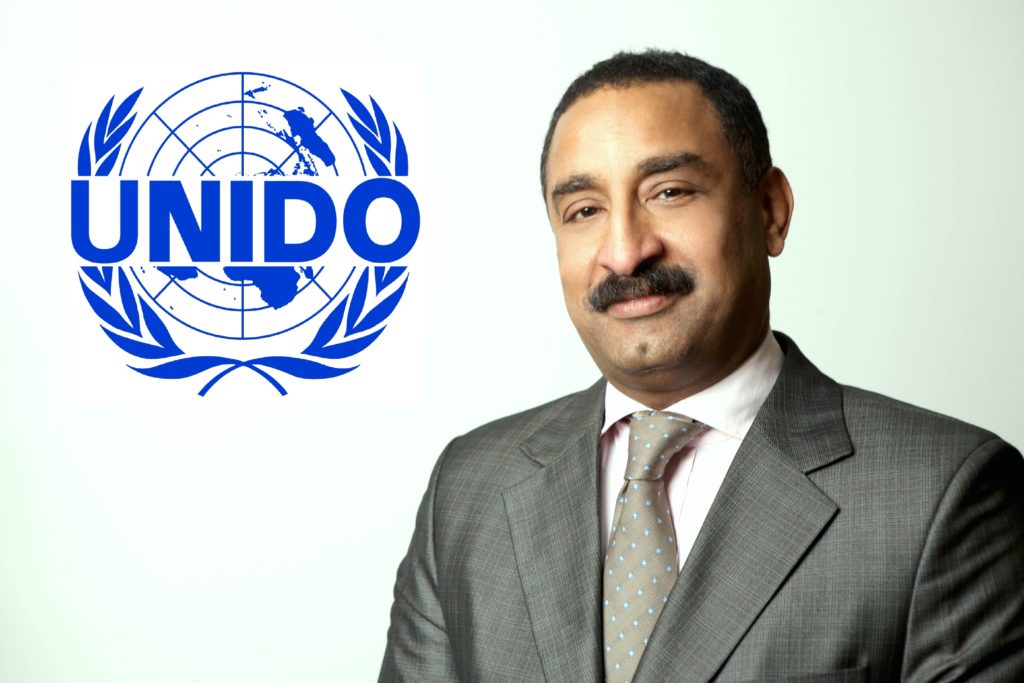 “Good Practices in South-South and Triangular Cooperation for Sustainable Development – Volume 2” under the theme “Combating poverty by empowering women and youth through financing of small projects”. Further to the above, ITPO Bahrain has been very active in Sudan with the Bank of Khartoum; in addition to that we are working closely with the Accounting and Auditing Organization for Islamic Financial Institutions and the World Business Angels Investment Forum in developing new financing instruments that are in line with Islamic Sharia compliant tools.Based on the above, our long experience over the past thirty years has proven that economic empowerment through financial inclusion must be on the top of the agenda to ensure achieving the Sustainable Development Goals.
“Good Practices in South-South and Triangular Cooperation for Sustainable Development – Volume 2” under the theme “Combating poverty by empowering women and youth through financing of small projects”. Further to the above, ITPO Bahrain has been very active in Sudan with the Bank of Khartoum; in addition to that we are working closely with the Accounting and Auditing Organization for Islamic Financial Institutions and the World Business Angels Investment Forum in developing new financing instruments that are in line with Islamic Sharia compliant tools.Based on the above, our long experience over the past thirty years has proven that economic empowerment through financial inclusion must be on the top of the agenda to ensure achieving the Sustainable Development Goals.
Dr. Hashim Hussein is the Head of the United Nations Industrial Development Organization—Investment and Technology Promotion Office (UNIDO-ITPO) and the Arab Regional Centre for Entrepreneurship and Investment Training (ARCEIT), a post that he has held with great distinction.


